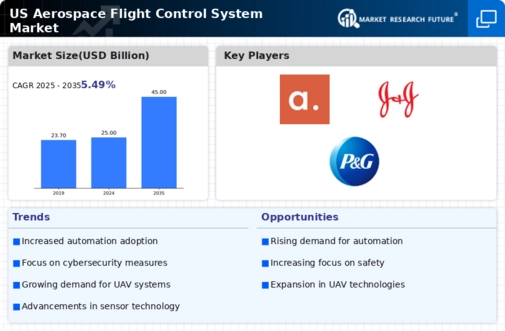Focus on Sustainable Aviation Practices
The US aerospace flight control system market is increasingly aligning with sustainable aviation practices, driven by growing environmental concerns and regulatory pressures. The FAA has set ambitious goals to reduce greenhouse gas emissions from aviation, prompting manufacturers to develop flight control systems that optimize fuel efficiency and minimize environmental impact. Innovations such as electric and hybrid propulsion systems are gaining traction, necessitating advanced flight control technologies to manage these new power sources effectively. The market is projected to grow as stakeholders prioritize sustainability in their operations, with estimates suggesting a potential increase of 12% in demand for eco-friendly flight control systems by 2028. This focus on sustainability not only addresses environmental challenges but also enhances the overall competitiveness of the US aerospace industry.
Regulatory Compliance and Safety Standards
The US aerospace flight control system market is heavily influenced by stringent regulatory compliance and safety standards set forth by the FAA and other governing bodies. These regulations mandate rigorous testing and certification processes for flight control systems, ensuring that they meet the highest safety benchmarks. The FAA's recent initiatives to enhance safety protocols have led to increased investments in advanced flight control technologies, as manufacturers strive to comply with these evolving standards. The market is expected to witness a compound annual growth rate (CAGR) of around 10% as companies prioritize safety and compliance in their product offerings. This focus on regulatory adherence not only enhances the safety of flight operations but also fosters consumer confidence in the aerospace industry.
Growing Demand for Unmanned Aerial Vehicles (UAVs)
The US aerospace flight control system market is witnessing a notable increase in demand for unmanned aerial vehicles (UAVs), driven by their diverse applications in sectors such as agriculture, surveillance, and logistics. The FAA has projected that the number of commercial UAVs in the US will exceed 1.5 million by 2027, necessitating advanced flight control systems to ensure safe and efficient operations. This burgeoning market segment is prompting manufacturers to develop specialized flight control solutions tailored for UAVs, which often require unique control algorithms and systems. As the UAV market expands, the demand for sophisticated flight control systems is likely to grow, presenting significant opportunities for innovation and investment within the aerospace sector.
Technological Advancements in Flight Control Systems
The US aerospace flight control system market is experiencing a surge in technological advancements, particularly in the realm of digital fly-by-wire systems. These innovations enhance aircraft performance, reliability, and safety. The integration of artificial intelligence and machine learning into flight control systems is becoming increasingly prevalent, allowing for real-time data analysis and adaptive control strategies. According to the Federal Aviation Administration (FAA), the adoption of advanced flight control technologies is projected to grow by approximately 15% annually through 2028. This growth is driven by the need for improved operational efficiency and reduced pilot workload, which are critical in modern aviation. As a result, manufacturers are investing heavily in research and development to create next-generation flight control systems that meet the evolving demands of the aerospace sector.
Increased Investment in Aerospace Research and Development
The US aerospace flight control system market is benefiting from increased investment in research and development (R&D) initiatives. Government agencies, including NASA and the Department of Defense, are allocating substantial funding to advance aerospace technologies, including flight control systems. This investment is aimed at enhancing the performance, safety, and efficiency of aircraft. For instance, the recent allocation of over $1 billion for aerospace R&D projects is expected to yield breakthroughs in flight control technologies. As a result, manufacturers are encouraged to collaborate with research institutions to develop cutting-edge solutions that address the challenges of modern aviation. This trend is likely to drive innovation and competitiveness within the US aerospace flight control system market.













